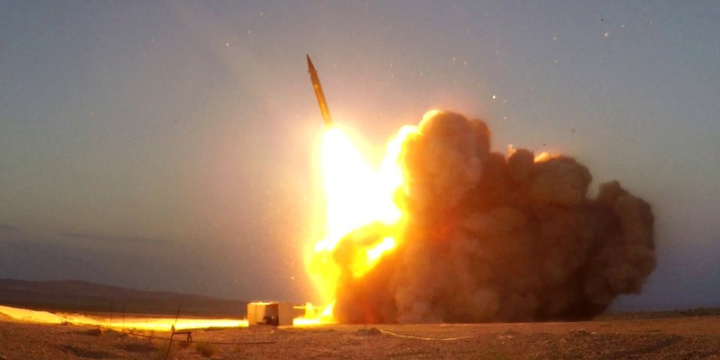US Lawmakers Introduce Bill Sanctioning Iranian Missile, Drone Programs
 by Andrew Bernard
by Andrew Bernard


A missile unveiled by Iran is launched in an unknown location in Iran in this picture received by Reuters on August 20, 2020. WANA (West Asia News Agency) via REUTERS
A bipartisan group of members of the House Foreign Affairs Committee on Tuesday introduced a bill to sanction Iran’s missile and drone programs ahead of a scheduled sunset of the UN’s sanctions on Iran’s ballistic missile program.
Rep. Michael McCaul (R-TX), chairman of the Foreign Affairs Committee, and Reps. Gregory Meeks (D-NY), Dean Phillips (D-MN), and Joe Wilson (R-TN) in a joint statement said that the bill would constrain Iran’s arsenal and deter other powers from supporting Iran and its proxies.
“Even with the UN restrictions in place, Iran’s missiles and drones are targeting US troops, allies, and partners across the Middle East and increasingly fueling Vladimir Putin’s illegal war of aggression against Ukraine,” they said. “Without urgent action, Iran’s missiles and drones could wreak even greater havoc around the globe come October.”
Under the terms of UN Security Council Resolution 2231, which gave force to the Joint Comprehensive Plan of Action (JCPOA) — the 2015 Iran Nuclear Deal — Iran was “called upon not to undertake any activity related to ballistic missiles designed to be capable of delivering nuclear weapons.” But like many of the restrictions in the JCPOA, that provision has a sunset clause and is set to expire in October.
The first of the sunset clauses — a UN embargo on Iranian conventional weapons imports – expired in 2020. By 2031, the JCPOA provisions limiting Iran’s enrichment and stockpiling of uranium are also set to expire.
According to its co-sponsors, the new Iran sanctions bill would impose property blocking and visa restrictions on anyone involved in the supply, sale, transfer, or support of Iranian missiles and drones, and their adult family members.
Despite the UN ban, Iran maintains a sophisticated ballistic program and has provided missiles and technology to Syria, Hezbollah, and the Houthis in Yemen. In September, Israel presented evidence that Iran had taken over scientific facilities in Syria for medium- and long-range missile production.
Iran is also accused of providing drones to Russia in support of Russia’s invasion of Ukraine. In January, a Ukrainian air force spokesman said that Ukraine had shot down more than 500 Iranian drones since September.
Iran has also stepped up its production of uranium. In March the International Atomic Energy Agency confirmed that it had detected uranium enriched to 83.7%, just shy of the 90% enrichment level that is considered “weapons grade.”
While President Biden has privately said that the JCPOA is “dead,” administration officials continue to say that they are pursuing a diplomatic solution.
In April, National Security Advisor Jake Sullivan told the Washington Institute for Near East Policy that diplomacy was still the best option to put Iran’s nuclear program “back in the box.”
“We are also engaging Iran diplomatically regarding its nuclear program, and we continue to believe that it was a tragic mistake to leave the deal with nothing at all to replace it,” Sullivan said. “But we have made clear to Iran that it can never be permitted to obtain a nuclear weapon. As President Biden has repeatedly reaffirmed, he will take the actions that are necessary to stand by this statement, including by recognizing Israel’s freedom of action.”
 Tehran Signals No Retaliation Against Israel After Drones Attack Iran
Tehran Signals No Retaliation Against Israel After Drones Attack Iran US Stops UN From Recognizing a Palestinian State Through Membership
US Stops UN From Recognizing a Palestinian State Through Membership Jordan Reaffirms Commitment to Peace With Israel After Iran Attack, Says Ending Treaty Would Hurt Palestinians
Jordan Reaffirms Commitment to Peace With Israel After Iran Attack, Says Ending Treaty Would Hurt Palestinians ‘Crisis at Columbia’: Elite University Spirals Into Chaos Against Backdrop of School President’s DC Testimony
‘Crisis at Columbia’: Elite University Spirals Into Chaos Against Backdrop of School President’s DC Testimony ‘A Time for Vigilance’: FBI Director Says Agency on Alert for Threats Against Jewish Community During Passover
‘A Time for Vigilance’: FBI Director Says Agency on Alert for Threats Against Jewish Community During Passover New Haggadah Released for Israeli Soldiers in Gaza Ahead of Passover
New Haggadah Released for Israeli Soldiers in Gaza Ahead of Passover ADL Data Reveals Alarming Campus Antisemitism, Despite Strong Jewish Life
ADL Data Reveals Alarming Campus Antisemitism, Despite Strong Jewish Life New Hospital Approved for Construction in Southern Israel Amid Gaza War
New Hospital Approved for Construction in Southern Israel Amid Gaza War UN Security Council to Vote Thursday on Palestinian UN Membership
UN Security Council to Vote Thursday on Palestinian UN Membership



 New Play Opening in NY Recounts Verbatim Testimonies From Oct. 7 Survivors, Families of Victims
New Play Opening in NY Recounts Verbatim Testimonies From Oct. 7 Survivors, Families of Victims UN Security Council to Vote Thursday on Palestinian UN Membership
UN Security Council to Vote Thursday on Palestinian UN Membership New Hospital Approved for Construction in Southern Israel Amid Gaza War
New Hospital Approved for Construction in Southern Israel Amid Gaza War ADL Data Reveals Alarming Campus Antisemitism, Despite Strong Jewish Life
ADL Data Reveals Alarming Campus Antisemitism, Despite Strong Jewish Life Iran Could Review ‘Nuclear Doctrine’ Amid Possibility of Israeli Strike, Iranian Commander Warns
Iran Could Review ‘Nuclear Doctrine’ Amid Possibility of Israeli Strike, Iranian Commander Warns